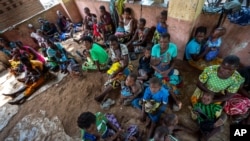In this year’s World Malaria Report, the World Health Organization is calling on countries to step up the fight against malaria, saying the coronavirus pandemic threatens to reverse important gains made in efforts to control this deadly disease.
Since 2000, the U.N.’s World Health Organization reports 1.5 billion malaria cases and 7.6 million deaths have been averted globally. Some of the greatest achievements were made in sub-Saharan Africa, which bears the brunt of this deadly disease spread by mosquitos.
Additionally, the director of the WHO’s Global Malaria Program, Pedro Alonso, said 21 countries have eliminated malaria over the last two decades. Of these, he says 10 have been officially certified as malaria-free by the WHO.
“That means that more than half of all the world’s endemic countries are within reach of elimination,” Alonso said. “In the beginning of the century, three countries had less than 10 cases per year. Now, we have 24 countries, which are literally one step away from elimination.”
Despite remarkable progress, however, the World Health Organization reports global gains have leveled off in recent years. This is because of insufficient funding and a lack of access to proven malaria control tools, such as insecticide-treated mosquito nets and preventive medicines for children.
The emergence of the coronavirus pandemic is now posing an additional challenge to the malaria response. WHO’s regional director for Africa, Matshidiso Moeti, said the gains made in Africa over many years against poverty and disease risk being reversed by the virus responsible for the COVID-19 disease.
“Already, malaria causes a 1.3 percent loss in Africa’s economic growth every year," Moeti said. "And we know that the COVID-19 pandemic is projected to push sub-Saharan Africa into recession for the first time in 25 years. This incredibly challenging situation requires renewed commitment to sustained and accelerate the gains that have been made in the fight against malaria.”
Moeti noted malaria continues to kill many more people than diseases like COVID-19 and Ebola.
In 2019, the WHO reported the global tally of malaria cases was 229 million, including more than 400,000 deaths. It said 90 percent of these cases and deaths were in the African region. Most of the victims were children.
The U.N. health agency reports global funding for malaria last year totaled $3 billion. This falls far short of the $5.6 billion needed to roll back malaria.
